|
|
|
Sort Order |
|
|
|
Items / Page
|
|
|
|
|
|
|
| Srl | Item |
| 1 |
ID:
134566


|
|
|
|
|
| Summary/Abstract |
This article argues that long-term changes in Turkish foreign policy are primarily due to the diversification of the country's political and economic interests. Important international structural shifts such as the end of the Cold War or the broad fluctuations in oil prices have constituted the initial impetus for the changes that we have seen in Turkish policies. Discussing alternative perspectives on new activism in Turkish foreign policy, the article gauges Turkey's foreign policy affinity (based on voting patterns in the United Nations General Assembly) and trade with other states to place recent trends in the broader context of the past three decades. It shows that, as the “West” has become less coherent in its policies, Turkey has moved closer to EU members and distanced itself from the US. The data also undermine “shift of axis” arguments as Turkey's foreign policy affinity with Middle Eastern countries has, in fact, declined. The trade data reveal a diversification of the country's commercial interests that contribute to Turkey's increasing regional activism. The country now balances its long term European interests with its recent regional ones.
|
|
|
|
|
|
|
|
|
|
|
|
|
|
|
|
| 2 |
ID:
134532


|
|
|
|
|
| Summary/Abstract |
Drawing on the pioneering work of Anthony Downs, political scientists have tended to characterize American politics as a game among undifferentiated competitors, played out largely through elections, with outcomes reflecting how formal rules translate election results into legislative votes. In this perspective, voters, campaigns, elections, and the ideological distribution of legislators merit extensive scrutiny. Other features of the political environment—most notably, the policies these legislators help create and the interest groups that struggle over these policies—are deemed largely peripheral. However, contemporary politics often looks very different than the world described by Downs. Instead, it more closely resembles the world depicted by E. E. Schattschneider—a world in which policy and groups loom large, the influence of voters is highly conditional, and the key struggle is not over gaining office but over reshaping governance. Over the last twenty years, a growing body of scholarship has emerged that advances this corrective vision—an approach we call “policy-focused political science.” In this framework, politics is centrally about the exercise of government authority for particular substantive purposes. Such exercises of authority create the “terrain” for political struggle, profoundly shaping both individual and group political behavior. More important, because policies can be so consequential, they also serve as the “prize” for many of the most enduring political players, especially organized interest groups. The payoffs of a policy-focused perspective include a more accurate portrayal of the institutional environment of modern politics, an appreciation for the fundamental importance of organized groups, a better understanding of the dynamics of policy change, and a more accurate mapping of interests, strategies, and influence. These benefits are illustrated through brief examinations of two of the biggest changes in American politics over the last generation: asymmetric partisan polarization and the growing concentration of income at the top.
|
|
|
|
|
|
|
|
|
|
|
|
|
|
|
|
| 3 |
ID:
135045
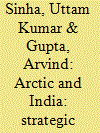

|
|
|
|
|
| Summary/Abstract |
A global temperature rise is being experienced earliest and most intensely in the Arctic region. The changes are worrying but the commercial interests are equally enticing. The Arctic is witnessing the convergence of the geophysical, the geo-economic and the geostrategic in strange and dramatic ways, making it a paradox and an antithesis. For India, the Arctic is distant when it comes to economic interests and near when it comes to climate change. As India today reassesses and rethinks its role in the new global geopolitical space, the Arctic becomes an important part of that reorientation and a movement towards a ‘global knowledge commons’. The Arctic is now an important geographical categorisation in India’s global policies. It must also be stressed that recent Arctic ascendancy in the policy domain stems directly from the strengthening of India’s climate change-linked economic and scientific positions in global world affairs.
|
|
|
|
|
|
|
|
|
|
|
|
|
|
|
|
| 4 |
ID:
136417


|
|
|
|
|
| Summary/Abstract |
This article examines the special features, trends, and dynamics of Iranian-Turkish relations in Central Asia (CA) in anticipation of removal of the sanctions from Iran and transformation of the entire international relations system. It analyzes the specifics of Turkey’s current Central Asian approaches and identifies the key external factors that are influencing the development of its relations with the region’s countries from the outside.
The author examines the new aspects of Ankara’s Central Asian strategy from this viewpoint, as well as the Islamic Republic of Iran’s (IRI) role in it. The author also stresses the importance of what she considers to be the main factors: Euro-Atlantic (the U.S. and EU) and Eurasian (Russia, China).
The article closes by noting that the increasing pragmatism and rationalism in the present approaches of Turkey and Iran is allowing them to establish balanced and restrained cooperation with the CA countries, keeping in mind their common historical-cultural and spiritual heritage, as well as the prospects for potentially mutually advantageous partnership within the framework of the planned New Silk Road energy transportation corridors.
In so doing, Iran or Turkey gaining a stronger position in the current system of relations will depend not only on resolving the current Iranian-American and other interstate problems, but also on the efficiency of their regional strategies and the degree to which the CA countries’ interests are observed.
|
|
|
|
|
|
|
|
|
|
|
|
|
|
|
|
| 5 |
ID:
134993
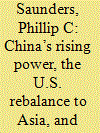

|
|
|
|
|
| Summary/Abstract |
The Obama administration’s “rebalance to Asia” has many elements of continuity with past policy, including recognition that rapid growth and economic dynamism have greatly expanded the Asia-Pacific region’s economic and strategic weight and importance to U.S. interests. Administration officials emphasize that the rebalance involves a comprehensive diplomatic, economic, and military approach that pays more attention to India, Southeast Asia, and regional institutions; that the timing was dictated largely by the need for clear priorities to guide force development in an era of declining spending; and that demand by U.S. allies and partners for an increased U.S. commitment to the region played an important role in shaping the rebalance. U.S. diplomatic, economic, and military efforts to implement the rebalance demonstrate a significant increase in strategic attention to the Asia-Pacific region, matched by commitments of diplomatic, economic, and military resources, including the time of senior U.S. leaders. Chinese officials and scholars have reacted by expressing concern and skepticism about the stated U.S. rationale, lamenting the “lack of strategic trust” between Washington and Beijing, urging greater respect for Chinese “core interests,” and stressing negative consequences of the rebalance for Asian security (especially its supposed role in emboldening U.S. allies and partners to challenge Chinese maritime territorial claims). At the same time, they have redoubled efforts to stabilize Sino-U.S. relations and to build a “new type of great power relations.” A key implementation challenge is making the rebalance robust enough to reassure U.S. allies and partners of the U.S. capability and will to maintain its presence in Asia over the long-term, while not alarming Chinese leaders to the point where they forego cooperation with Washington. U.S. and Chinese leaders should work to expand and deepen the scope of bilateral cooperation on common interests, while seeking ways to limit and manage competitive aspects of U.S.-China relations.
|
|
|
|
|
|
|
|
|
|
|
|
|
|
|
|
| 6 |
ID:
135050


|
|
|
|
|
| Summary/Abstract |
For nearly a quarter of the past century a series of notable changes have taken place in the Arctic. All of them, whether political, economical, environmental or climate-related, inevitably had an impact on regional and global governance. This commentary mainly focuses on the role of China in Arctic affairs in the context of global change and global governance.
|
|
|
|
|
|
|
|
|
|
|
|
|
|
|
|
| 7 |
ID:
134761


|
|
|
|
|
| Summary/Abstract |
The rapid establishment of Confucius Institutes all over the world has raised a question of doubt about the motivation of China. From the perspective of China, the institutes can help to promote Chinese language and culture, and project a positive image of China as a benign country. However, other countries may wonder how far China would like to exert its soft power and cultural influence on the rest of the world. This article aims to examine multiple reactions and interactions related to this issue. To understand views from different perspectives, a survey of academics, researchers and Confucius Institute administrators was conducted and diverse views were found. Accordingly, the development of mutual trust associated with the phenomenon appears to be at an early stage, and the impact of Confucius Institutes on their host countries is not yet fully apparent.
|
|
|
|
|
|
|
|
|
|
|
|
|
|
|
|
| 8 |
ID:
134521


|
|
|
|
|
| Summary/Abstract |
This paper examines how the circumstances of democratic transition affect the consequences of losing office for outgoing dictators. Using data on constitutional origins and democratization from 1875 to 2004, we find that outgoing dictators who are able to impose a holdover constitution during democratization and beyond are less likely to face severe punishment upon relinquishing their rule. These results hold after accounting for alternative explanations of autocrats' post-tenure fate and after using instrumental variables to adjust for potential endogeneity. We also document several mechanisms by which this occurs: proportional representation, the election of right-wing executives, post-transition military influence, and elite control over local politics. The findings suggest that for dictators who fear their ousting in the face of domestic unrest or potential instability, democracy can provide a plausible avenue for protecting their most basic interests.
|
|
|
|
|
|
|
|
|
|
|
|
|
|
|
|
| 9 |
ID:
136863
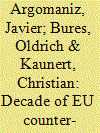

|
|
|
|
|
| Summary/Abstract |
The Treaty on the European Union (EU) stipulates that one of the key objectives of the Union is to provide citizens with a high level of safety within an Area of Freedom, Security and Justice (AFSJ). Given that the fight against terrorism is a prominent aspect of this general objective, it is remarkable that, in spite of its political relevance and decade-long history, it has only relatively recently received due attention in the academic community.1 At the time of writing, only a handful of post-9/11 edited volumes and special issues have focused on specific aspects of the EU counterterrorism efforts2 and initial monographs on the subject have only been relatively recently published by the three editors behind this special issue: Argomaniz3 has produced a theoretically informed assessment of the coherence of the EU response, Bures4 has examined the extent to which the EU can offer an added value in the fight against terrorism in Europe and Kaunert5 has studied how counter-terrorism has been a driver in the process of construction of the EU's AFSJ.
|
|
|
|
|
|
|
|
|
|
|
|
|
|
|
|
| 10 |
ID:
136817


|
|
|
|
|
| Summary/Abstract |
The strong motivated ISIS is a indirectly, the creation of International Community. Had the international community taken early step and forced al-Assad to step down by supporting his democratic opponents, this monster would not have been there. Policies persuaded by the powers like Russia, China and America perpetuated the autocratic rulers al Assad in Syria and this made the entry and position of ISIS strong.
|
|
|
|
|
|
|
|
|
|
|
|
|
|
|
|
| 11 |
ID:
136816


|
|
|
|
|
| Summary/Abstract |
Central Asia having emerged as an important region of global energy scenario becomes a target of the Great Game Politics. While the presence of hydrocarbon resources were relatively known during the Soviet era, entry and explorations by major energy giants of the West during the last two decades has confirmed that Central Asia will be an additional, though not an alternative source for their growing energy needs. The Western firms initiated the politics and process of Multiple Pipeline network to have access to energy of Central Asia which has generated competition and conflict among major players. Being its southern underbelly, Russia’s energy giants with strong support of leadership, have been aggressively pursuing their economic and political interests in Central Asia. China has emerged as a major power having worked out a well planned and funded roadmap in Central Asia’s energy sector to meet its fast increasing demand. Russia and China have commonality of interests to counter the West which is keen to enhance its presence and acquire oil and gas bypassing Russia. The West is supported by leadership of Central Asia who want to diversify their market and promote their national interest. India, though late and not a major player, having close and cordial relations with the CAS, can and should explore various alternatives to meet its growing energy security needs from Central Asia.
|
|
|
|
|
|
|
|
|
|
|
|
|
|
|
|
| 12 |
ID:
134530


|
|
|
|
|
| Summary/Abstract |
In recent years, the American political parties have shifted their positions on elementary and secondary education policy, both relative to each other and to their own past positions. Established explanations for party issue position-taking privilege the influence of groups in the parties' coalitions; yet in this case, both parties have taken positions opposed by important components of their bases. We develop a general framework for understanding party issue position adoption and change that highlights the role of issue definition—the considerations, values, and goals associated with a policy debate at any one time. This framework helps us to explain the participation and preferences of groups regarding an issue; the perceived ideological fit and strategic benefits of issue positions for parties; and how parties negotiate and manage issue conflict within their coalition. We apply that framework to the case of education policy, showing how education issue definition has changed over time—from a focus on resources and equality to an emphasis on values and excellence—and how those changes have been consequential for each party's changing, and converging, positions on education policy. We conclude by discussing the potential application of our model of party issue positioning to other issues in American politics.
|
|
|
|
|
|
|
|
|
|
|
|
|
|
|
|
| 13 |
ID:
136289
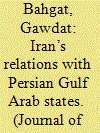

|
|
|
|
|
| Summary/Abstract |
In the first press conference as the elected president Hassan Rouhani pledged good relations with neighboring countries, which he considered a main priority for his administration. The president stated, the Persian Gulf has strategic importance both in terms of politics and economy”
|
|
|
|
|
|
|
|
|
|
|
|
|
|
|
|
| 14 |
ID:
135349


|
|
|
|
|
| Summary/Abstract |
The China/North Korea border has always been somewhat porous. Since the se-vere famines in the 1990s, the flow of migrants has tended to be towards China with a primarily illegal population of North Koreans seeking work, political freedom or simply essential supplies. Children from North Korea in China have a particularly precarious status. Either they are illegal immigrants themselves or they have mothers who are illegal immigrants. But, when interviewed, they did not repeat the stories of famine, endemic shortage and desperation which are so common in media reportage. Instead they spoke of a desire for a better life, with more opportunity, security and flexibility. It seems that the social, political and economic realities of the DPRK are changing rather faster than the dis-course which surrounds the country.
|
|
|
|
|
|
|
|
|
|
|
|
|
|
|
|
| 15 |
ID:
135046


|
|
|
|
|
| Summary/Abstract |
South Korea is not a traditional Arctic state, but it has several key interests in the region. This article explores the sources of those interests and the country’s commercial activities in the Arctic in the areas of shipping, shipbuilding and hydrocarbons. Since the country’s polar interests transcend commerce, however, attention is also paid to the importance of science and research and development in Korean culture. The article examines South Korea’s regional role in the Arctic, arguing that the country fits into an expanded area of Arctic destinational shipping centred on the Northern Sea Route. Arctic states have generally welcomed the country as a partner in the region, and South Korea’s rise in the north appears likely to continue as part of its broader effort to transform into a globally important political and economic actor.
|
|
|
|
|
|
|
|
|
|
|
|
|
|
|
|
| 16 |
ID:
135064


|
|
|
|
|
| Summary/Abstract |
This article draws on literature, media reports official Mongolian press releases and statements and a number of informal interviews and discussions with Mongolian policymakers and politicians.
Mongolia’s unique relationship with and access to the DPRK’s leadership has primarily proven to be a most valuable asset in boosting Mongolia’s profile in the region and the world at large. Whether Mongolia can spearhead a regional security mechanism, as suggested by both Mongolian politician and international analysts remain to be seen.
|
|
|
|
|
|
|
|
|
|
|
|
|
|
|
|
| 17 |
ID:
135052


|
|
|
|
|
| Summary/Abstract |
In his Murmansk speech in 1987, Gorbachev proposed the Arctic as the shortest sea route linking Europe to the Far East and the Pacific Ocean, triggering a new perspective on the region.1 Since then, the 1991 Arctic Environmental Protection Strategy (AEPS), referred to as the Finnish Initiative, has been created as a multilateral, non-binding agreement among Arctic states to protect the environment by monitoring, assessment, emergency preparedness/response, and conservation of the Arctic zone. It has been called a major political accomplishment of the post-Cold War era.2 Based on the AEPS, eight Arctic states established the Arctic Council under the 1996 Ottawa Declaration for protection of the Arctic environment and people in the Arctic region. The Arctic Council played a crucial role as a pre-eminent intergovernmental body while maintaining its status as a non-binding high-level forum among member states. During the last 17 years, under the 1st round of the Arctic Council, it has successfully addressed the major agendas described in the founding declaration.
|
|
|
|
|
|
|
|
|
|
|
|
|
|
|
|
| 18 |
ID:
135964


|
|
|
|
|
| Summary/Abstract |
AS IS WELL KNOWN, AMERICANS WITH HIGHER INCOMES tend to be more politically active than lower-income citizens. They vote more often, engage in more political discussions, attend more campaign events, contribute more money, and contact more public officials.1 But research to date has only examined the moderately affluent respondents that surveys of the general public are able to reach: the top 20 percent or 30 percent of income earners. What about really wealthy Americans, with incomes or wealth in the top 1 percent, who might potentially have a great deal of political influence? Do they—as resource-based theories would suggest2—participate at still higher levels than the merely affluent? Do they more often initiate contacts with high-level government officials? If so, about what? Matters of narrow economic self-interest or the common good (as they see it)? Answers to these questions may have implications for the workings of democratic politics.
|
|
|
|
|
|
|
|
|
|
|
|
|
|
|
|
| 19 |
ID:
134526
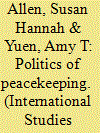

|
|
|
|
|
| Summary/Abstract |
Why are some peacekeeping mandates broad and expansive while others are narrow and well defined? Does variation in mandate flexibility reflect the needs inherent in resolving the conflict or the political interests of powerful states? The modern thread of debate surrounding UN action focuses on whether the political interests of the Permanent Five (P5) members in the Security Council or the stated goals of the institution as a whole drive UN behavior. While most analyses focus on where the UN intervenes to assess the political “pull” that member states exert on the institution, we examine variation in operational latitude across UN peacekeeping in war-torn states. Our analysis offers three main results. Powerful states do constrain international bureaucracies; however, bureaucratic independence varies with the intrinsic interests of the P5. Further, heterogeneity across powerful state preferences systematically affects bureaucratic flexibility in peacekeeping.
|
|
|
|
|
|
|
|
|
|
|
|
|
|
|
|
| 20 |
ID:
135464


|
|
|
|
|
| Summary/Abstract |
Rammanohar Lohia (1910-1967) was an unusual politician, who was highly educated, committed to the cause of the common people, and was proud of India with its past glory, religious traditions, ethnic diversity and geographical expanse. He had no hesitation in seating, conversing and sharing his social thoughts and political ideas with young and old, men and women, illiterate and highly accomplished scholars, simplest rural folk and sophisticated literati and, in fact, anybody and everybody. He believed in mass mobilization on the issues of common and public interests and he had no time to relax as long as he was alive. He was a restless soul, who was perennially travelling to distant and difficult parts of the country and sharing lives of the co-workers through the length and breadth of the country. He was a mobile dynamo, who was restless to reach each and every corner of the country with his brand of message for the resurgent India. He was a Gandhian, who did not feel obliged to be imprisoned in the creed of non-violence; he was a proud Hindu, whose life centered around Hindu–Muslim unity; and he was a Hindi zealot, who desired healthy growth of all the Indian languages. He began his political career as a Congressman, but soon gravitated to socialist ideology and remained a diehard socialist till the end. He was one of the founders of the Congress Socialist Party (CSP), Socialist Party (SP), Praja Socialist Party (PSP), and Sanjukta Socialist Party (SSP) of India. He was one of most vocal critics of the Indian National Congress, the ruling party of the newly independent India and its popular Prime Minister, Jawaharlal Nehru.
|
|
|
|
|
|
|
|
|
|
|
|
|
|
|
|
|
|
|
|
|